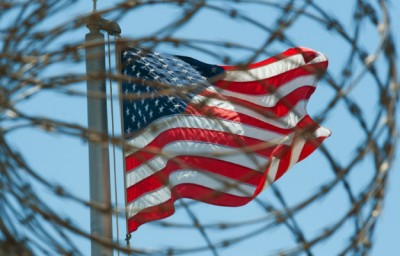Ignoring U.S. Abuse and Violations: Human Rights Watch’s Hypocrisy Over U.N. Human Rights Council

Today sees the publication of a new report by a coalition of human rights NGOs, as publicised by Human Rights Watch Executive Director Ken Roth on Twitter.
The release opens by saying that ‘The international community should ensure that States responsible for gross human rights violations and that fail to protect human rights defenders or cooperate with the UN are not elected to the UN’s top human rights body’.
It goes on to say that ‘Failure by Council members to take effective measures to address violations of human rights for which they are responsible, particularly of a gross or systematic nature, or to fully cooperate with the Council and its mechanisms undermines the ability of the Council to promote and protect human rights ‘, and then specifically references states like ‘Russia, China and Saudi Arabia’ as examples.
But couldn’t these things – gross human rights violations, failure to protect human rights defenders, and failure to address systematic human rights abuses – all apply to the United States of America?
1. Gross Human Rights Violations
Is not the continuing and long term detention of 46 people without charge or trial in Guantanamo Bay, including their force feeding, a ‘gross human rights violation’? Amnesty International certainly think so, saying last month that the camp has become ‘emblematic of the gross human rights abuses perpetrated by the U.S. Government’. The Obama administration, incidentally, has tried to codify indefinite detention without charge or trialinto U.S. law. (See also: Drones)
2. Failure to protect human rights defenders
It is beyond any reasonable doubt that Chelsea Manning, the U.S. Army Private who provided the now infamous trove of U.S. diplomatic cables and combat videos to Wikileaks, did so because she was deeply concerned about what those cables and videos demonstrated about the nature of the wars in Iraq and Afghanistan. Among other things, they exposed the (at best) indiscriminate killing of civilians, and the complicity with torturecarried out by the Iraqi security forces. It is fair to say, then, that Manning was motivated by a desire to defend human rights by exposing her own governments human rights abuses. Have the U.S. subsequently defended her? Emphatically, no. What they did instead is subject her to months of cruel and unusual punishment, and then jail her for 35 years.
3. Failure to take effective measures to address violations of human rights
It is, once again, beyond any reasonable doubt that the Bush administration systematically tortured as a matter of policy. The memos exposing these policies are in the public domain, and Bush has proudly admitted to it. The response of the Obama administration has been to grant the perpatrators retrospective immunity from prosecution, in itself a crime.
So a review of the publically available evidence, from mainstream sources – evidence which HRW itself is aware of and has publicised on occasions – demonstrates that in recent years the U.S. has indeed been guilty of these things the report condemns: gross human rights violations, failure to protect human rights defenders, and failure address to systematic human rights abuses.
You would think, then, that the U.S. would be a prime candidate to be kept off the U.N. Human Rights Council, given that they meet the criteria. Human Rights Watch, though, apparently beg to differ.
In October 2011, for example – long after Manning had abeen arrested, the long term detention without trial had been exposed, and the impunity for torturers cemented – Peggy Hicks, global advocacy director at Human Rights Watch, was arguing to the Tom Lantos Human Rights Commission that ‘Human Rights Watch welcomed the decision by the United States to seek a seat on the UN Human Rights Council’.
She goes on to say that ‘we were optimistic that US engagement would have a positive impact at the Human Rights Council’, and then argues that ‘the US has shown that its involvement at the HRC can be a game-changer, and we have empirical evidence that US work at the Council is making a difference for human rights victims and defenders across the globe’.
That is, not only were they refraining from calling for the U.S. to be prevented from joining the Human Rights Council, they were actively praising and defending the U.S. decision to do so. This pro-U.S. membership position does seem like a clear contradiction of Human Rights Watch’s current stance that they would like states responsible for human rights violations, failure to protect human rights defenders, and failure to hold people to account for human rights abuses kept off the Human Rights Council.
It might be worth keeping an eye out to see if that position changes, and they do indeed start to campaign for the U.S. to be kept off the council, given their gruesome and continuing track record.
That’s probably just another example of the way in which Human Rights Watch (and other mainstream human rights NGOs) tend to go much easier on the crimes of Official Bad Guys like ‘Russia, China’ than they do on the crimes of Official Good Guys like the U.S..
Rights abusers must be kept off the Council . . . unless those abusers are our mates.


